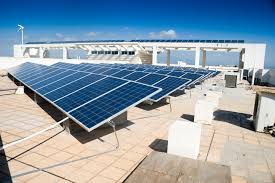
As the world shifts toward renewable energy, commercial solar panel are becoming an essential investment for businesses. By leveraging solar power, companies can drastically reduce electricity bills, enhance their sustainability initiatives, and achieve energy independence.
This guide will walk you through everything you need to know about commercial solar panels—how they work, their benefits, installation process, and why now is the ideal time to make the switch.
What Are Commercial Solar Panels?
Commercial solar panels are photovoltaic (PV) systems designed to meet the energy needs of businesses, industrial facilities, and large-scale enterprises. These systems are capable of generating substantial amounts of electricity, making them suitable for high-energy-demand applications.
Key Components:
-
Solar Panels: Convert sunlight into direct current (DC) electricity.
-
Inverter: Transforms DC into alternating current (AC), usable by electrical appliances.
-
Mounting Systems: Secure panels to roofs, carports, or the ground.
-
Battery Storage (Optional): Stores excess energy for use during peak hours or emergencies.
Why Choose Commercial Solar Panels?
1. Cost Savings
Electricity bills are a major expense for businesses. Installing commercial solar panels can significantly reduce these costs by generating free electricity from the sun.
Many businesses report a return on investment (ROI) within 3-5 years, followed by decades of reduced energy expenses.
2. Environmental Impact
Switching to solar power demonstrates a commitment to sustainability. By reducing reliance on fossil fuels, businesses can cut their carbon footprint and contribute to a greener future.
3. Energy Independence
Commercial solar panels provide energy security, protecting businesses from rising utility rates and power outages.
4. Government Incentives
Many governments offer tax credits, grants, and rebates to encourage the adoption of solar energy. These incentives can offset installation costs, making solar panels a more affordable option.
5. Enhanced Brand Image
Incorporating renewable energy into your business strategy appeals to eco-conscious consumers and investors. It showcases your commitment to corporate social responsibility.
How Commercial Solar Panels Work
-
Sunlight Absorption: Solar panels capture sunlight and convert it into DC electricity.
-
Conversion: An inverter changes DC into AC, which powers your business operations.
-
Usage and Storage: Electricity is either used immediately, stored in batteries, or fed back into the grid.
-
Net Metering: Excess energy sent to the grid can earn you credits, further reducing energy costs.
Benefits of Commercial Solar Panels
1. Financial Savings
-
Reduced electricity bills.
-
Lower operational costs.
-
Long-term financial benefits with minimal maintenance costs.
2. Sustainability Goals
-
Reduced greenhouse gas emissions.
-
Alignment with global environmental standards.
-
Contribution to the global renewable energy transition.
3. Competitive Edge
-
Attract environmentally conscious clients and partners.
-
Differentiate your brand in a competitive market.
4. Increased Property Value
-
Properties equipped with solar panels are more attractive to buyers or tenants.
5. Scalability
-
Start with a small system and expand as your energy needs grow.
Installation Process for Commercial Solar Panels
-
Initial Consultation
A solar energy expert evaluates your energy usage and recommends the ideal system size and design. -
Site Assessment
Technicians inspect the property to determine the best location for solar panel installation, taking into account sunlight exposure, shading, and roof conditions. -
System Design
A customized plan is created, tailored to your business’s energy requirements and budget. -
Permits and Approvals
The installer obtains the necessary permits and ensures compliance with local regulations. -
Installation
Solar panels, inverters, and other components are installed. The process typically takes 1-2 weeks, depending on the system size. -
Testing and Activation
The system is tested and connected to the grid, ensuring optimal performance. -
Maintenance
Regular cleaning and occasional inspections keep the system running efficiently for 25+ years.
Factors to Consider Before Installing Commercial Solar Panels
-
Energy Requirements: Assess your current and future energy needs to determine the system size.
-
Roof Condition: Ensure your roof can support the weight and installation of solar panels.
-
Budget and Financing: Explore financing options such as solar loans, leases, or power purchase agreements (PPAs).
-
Incentives: Research available government subsidies and tax benefits.
-
Battery Storage: Decide whether to include storage solutions for greater energy autonomy.
How Commercial Solar Panels Boost ROI
1. Reduced Overhead Costs
Lower utility bills result in significant annual savings, freeing up capital for other investments.
2. Tax Benefits
Take advantage of tax credits and accelerated depreciation to recover a portion of installation costs.
3. Grid Independence
Avoid unpredictable energy rate hikes and reduce dependency on traditional energy providers.
4. Energy Sales
Generate additional income by selling excess electricity back to the grid.
Real-Life Success Stories
Case Study 1: Retail Chain
A popular retail chain installed solar panels across its outlets, cutting energy costs by 40% annually. The system paid for itself within five years.
Case Study 2: Manufacturing Facility
A manufacturing plant transitioned to solar energy, achieving energy independence and reducing its carbon footprint by 30%.
Case Study 3: Educational Institution
A university integrated solar panels into its campus infrastructure, saving on electricity and teaching students about renewable energy.
Why Now Is the Best Time for Commercial Solar Panels
-
Declining Installation Costs
The cost of solar panels and installation has decreased significantly in recent years. -
Rising Electricity Prices
Lock in lower energy costs by switching to solar power. -
Increased Government Support
Governments worldwide are incentivizing solar energy adoption with grants, tax credits, and rebates. -
Technological Advancements
Improvements in solar technology have made systems more efficient and reliable. -
Consumer Expectations
Consumers are more likely to support businesses that adopt eco-friendly practices.
Investing in commercial solar panels is a forward-thinking decision for any business. From reducing operational costs to achieving sustainability goals, the benefits are undeniable. With declining costs, government incentives, and the increasing need for energy independence, there’s never been a better time to make the switch.
By installing commercial solar panels, businesses can contribute to a greener planet while reaping financial rewards. Consult a trusted solar energy provider today to start your journey toward a sustainable future.